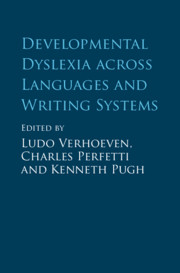Book contents
- Developmental Dyslexia across Languages and Writing Systems
- Developmental Dyslexia across Languages and Writing Systems
- Copyright page
- Contents
- Figures
- Tables
- Contributors
- 1 Introduction
- Part I Developmental Dyslexia across Languages and Writing Systems
- Part II Cross-Linguistic Perspectives on Developmental Dyslexia
- 11 Behavioral Precursors of Developmental Dyslexia
- 12 Neural Predictors of Developmental Dyslexia
- 13 Neurocognitive Markers of Developmental Dyslexia
- 14 Role of Visual Attention in Developmental Dyslexia
- 15 Morphological and Semantic Processing in Developmental Dyslexia
- 16 Modeling the Variability of Developmental Dyslexia
- 17 Modeling Developmental Dyslexia across Languages and Writing Systems
- 18 Etiology of Developmental Dyslexia
- 19 Intergenerational Transmission in Developmental Dyslexia
- Epilogue
- Index
- References
15 - Morphological and Semantic Processing in Developmental Dyslexia
from Part II - Cross-Linguistic Perspectives on Developmental Dyslexia
Published online by Cambridge University Press: 27 September 2019
- Developmental Dyslexia across Languages and Writing Systems
- Developmental Dyslexia across Languages and Writing Systems
- Copyright page
- Contents
- Figures
- Tables
- Contributors
- 1 Introduction
- Part I Developmental Dyslexia across Languages and Writing Systems
- Part II Cross-Linguistic Perspectives on Developmental Dyslexia
- 11 Behavioral Precursors of Developmental Dyslexia
- 12 Neural Predictors of Developmental Dyslexia
- 13 Neurocognitive Markers of Developmental Dyslexia
- 14 Role of Visual Attention in Developmental Dyslexia
- 15 Morphological and Semantic Processing in Developmental Dyslexia
- 16 Modeling the Variability of Developmental Dyslexia
- 17 Modeling Developmental Dyslexia across Languages and Writing Systems
- 18 Etiology of Developmental Dyslexia
- 19 Intergenerational Transmission in Developmental Dyslexia
- Epilogue
- Index
- References
Summary
This chapter examines the theoretical and empirical foundations of the roles of morphological and semantic skills in developmental dyslexia. Morphemes are the minimal units of meaning by which we create new words in any given language (e.g., “magic”+“ian” = “magician”). Semantics is the study of meaning, broadly speaking. In this chapter, we review data on children’s access to meaning at the word and sentence level in tasks, primarily in the oral modality. This review is important because of two common assumptions. The first is of the dominant role of phonological skills in dyslexia, an assumption that has limited the scope of empirical exploration into other potentially implicated factors. The second is that people with dyslexia have a strength in morphology and semantics, a speculation with surprisingly little empirical foundation. We first review the theoretical background for these speculations. We then present the available research evidence, focusing specifically on children with dyslexia, for alphabetic, morphosyllabic, and abjad writing systems.
Information
- Type
- Chapter
- Information
- Developmental Dyslexia across Languages and Writing Systems , pp. 327 - 349Publisher: Cambridge University PressPrint publication year: 2019
References
Accessibility standard: Unknown
Why this information is here
This section outlines the accessibility features of this content - including support for screen readers, full keyboard navigation and high-contrast display options. This may not be relevant for you.Accessibility Information
- 13
- Cited by
